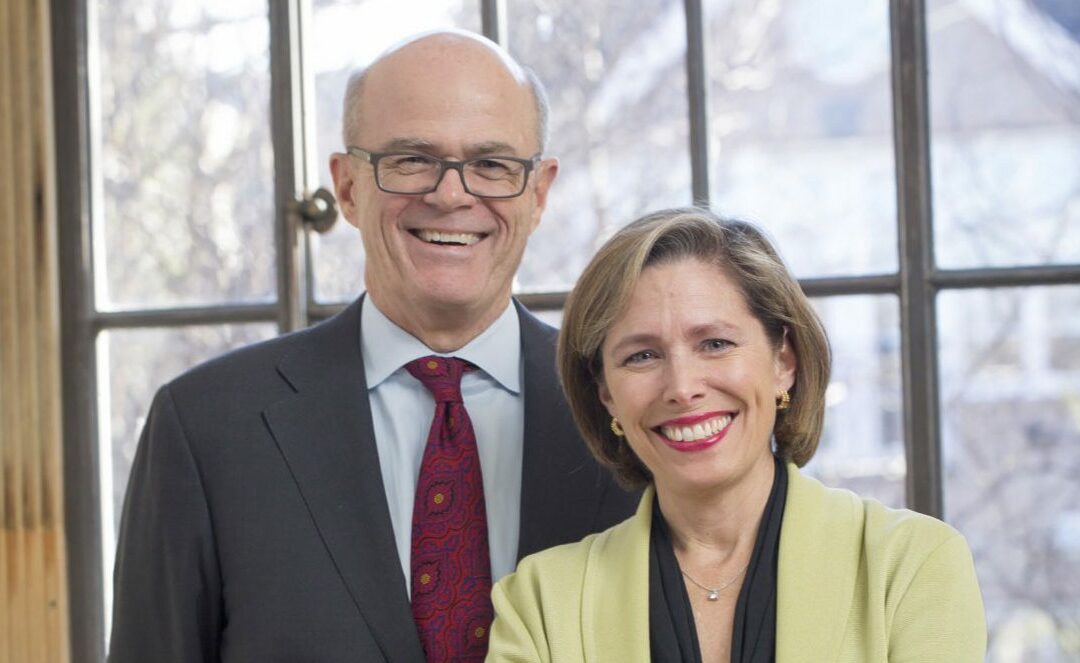Podcast: Play in new window | Download
Subscribe: Spotify | Email | RSS
How to Create a Conscious Development Leadership Cultures in the Workplace with Ed Offterdinger & Catherine Allen
In this week’s episode, Jenn welcomes TWO guests to The Leadership Habit podcast! Ed and Catherine are the Co-Founders of AO People Partners, a conscious leadership and people development firm specializing in creating successful, world-benefiting businesses. They also co-authored the well-received book Conscious, Capable, and Ready to Contribute: How Employee Development Can Become the Highest Form of Social Contribution.
Meet Ed & Catherine
Ed and Catherine have a combined 50+ years of experience working collaboratively with elite business and nonprofit leaders to successfully scale their business and mission objectives. Ed helped launch Baker Tilly, now one of the top ten consulting and CPA firms in the US. As AO’s CEO, Catherine writes and speaks regularly on leadership development and why people development in the workplace should become a recognized and incentivized form of social contribution.
What is a Conscious Development Culture?
As the episode begins, Jenn asks Ed & Catherine what “conscious development” means. Catherine explains, “A conscious development culture is really an intentional or conscious way of operating as an organization that cares about and supports the many ways that employees can learn and grow every day in their workplace.
It’s really important to help bridge the work that people perform every day and their developmental journey because growing their capabilities at work is really where adults have access to learning about self-awareness and a growth mindset, or what it means to think critically, empathy and compassion. All of these people skills or mind skills that we need in addition to our technical skills. And we believe that the workplace really needs to have a culture that enables people to grow and develop in a safe and productive way every day.”
What is Conscious Capitalism?
Then, Ed explains that conscious development cultures and conscious capitalism go hand in hand because they share important values. Ed defines conscious capitalism for the audience, “John Mackey and Raj Sisodia published a book probably 10 years ago called Conscious Capitalism. And it lays out four basic principles, and I’ll just rattle through them reasonably quickly for your audience.
So, first and foremost, conscious capitalism starts with the premise that business done well elevates humanity. So, I like to say capitalism’s not the problem. We’ve got some bad capitalists, but fundamentally, capitalism is about lifting humans because we all want or need to live, earn fair wages and create jobs. People wanna work. So it starts with that.
And then the first tenant is a higher purpose. And so people wanna work at companies who actually have big missions and goals. Jim Collins, you know, he’d say that higher purpose is the fundamental reason for existence beyond just making money. What’s the why? And if you think about the two most predominant generations working today, millennials in the next generation, they ask a lot about why. So as a business, being able to articulate that and have a big vision and mission and a “why” is very attractive.”
The Role Conscious Leadership
Later, the three leadership experts discuss the role of conscious leadership in creating a strong company development culture. Ed explains that conscious leaders have integrity, they live a higher purpose. They typically have high Emotional Intelligence, which they have worked on and honed.
Jenn agrees and highlights that a conscious culture starts with trust, accountability and caring about people. They discuss the importance of living the values you state on the website and embedding those values into your culture.
Why is People Development Important?
Next, Catherine discusses the need for development in today’s fast-paced business world. She emphasizes the importance of developing effective leaders to face the challenges of the world. If we are going to address big issues like the environment, social issues or global disasters, we need a higher level of intellectual, emotional and social intelligence. She explains that the need for development has three important implications:
- We must start to see people development as a core purpose of the workplace.
- We have to get better at developing people in the workplace.
- We must begin to design organizations that are intentionally better at developing people.
The Advantages of a Conscious Culture
Then, Ed provides some data points that show that conscious companies have higher returns than most companies on the S&P 500. Conscious workplaces also enjoy lower levels of turnover. Additionally, a large percentage of employees say they would be more likely to stay with an organization that invests in their personal development or provides learning opportunities.
An organization’s culture is the key to employee engagement, and effective leadership builds trust. Creating a strong culture will make employees feel safe and valued. Ed believes that creating a conscious development culture is the key to business success, especially in today’s challenging business environment.
Four Ways to Build a Conscious Development Culture
Catherine then explains four basic steps to setting the foundation for a conscious development culture.
- Make business development part of your business strategy.
- Ensure leaders understand their role in owning, modeling and driving the development agenda– and are held accountable for it.
- Identify the most important skill sets for your organization. Create a common language of development throughout the organization by letting employees know the core competencies they need.
- Integrate development messages and practices into the employee life cycle. Messaging around commitment and expectations around development should begin at onboarding and continue throughout their career at the organization.
Where to Learn More From Ed & Catherine
As the episode wraps up, Jenn, Ed & Catherine discuss so much more, so be sure to listen to the entire episode! If you would like to find out more from Ed Offterdinger and Catherine Allen, check out the links below!
- Visit their Website
- Get Their Book: Conscious, Capable, and Ready to Contribute: How Employee Development Can Become the Highest Form of Social Contribution.
- Connect on LinkedIn:
Thanks as always for listening to The Leadership Habit Podcast





